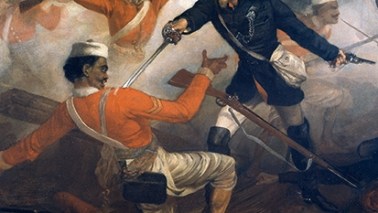In Cold Skin, a brilliantly suspenseful début novel by Albert Sánchez Piñol set in the years after the end of the first world war, a young man arrives on a desolate Antarctic island, where for the next 12 months he will study the local climate. Oddly, his predecessor, who was due to be collected, cannot be found; there is only a half-mad lighthouse-keeper, who appears to be the island’s only other inhabitant — or so it seems until night falls, when the man hears the patter of feet outside his window.
The novel borrows from so many popular genres — horror, thriller, B-movie — and yet ultimately transcends them all and is classifiable only as an excellent book. The man’s nightmarish adversaries, of which, it turns out, there are thousands, are terrifying for combining savage rapacity with a curiously childlike appearance. Later, when he tries to understand them, they naturally lose some menace, since it is Piñol’s intention to show that the greater part of fear lies in ignorance. But even then it is difficult, for quite some time after finishing this novel, to dispel the sense of alarm that they create.
The Amnesia Clinic covers ground regularly encountered in the comic-literary first novel, namely the rites of passage of a pair of precocious, arty adolescents, but manages to stand out thanks to both the exotic location (a well-rendered Ecuador) and the unostentatious tightness of James Scudamore’s prose. The novel is narrated by Anti, an extremely bright yet unglamorous English boy whose parents’ careers have brought him to Ecuador. Anti’s safe, ex-patriate life is enlivened by his more charismatic classmate, Fabián, who lives with a rich, eccentric uncle following the death of his parents in a car crash.
The boys are inveterate storytellers; theirs is a world of shrunken heads and voodoo curses. But it seems as though Fabián is becoming detached from reality. When Anti mocks up a newspaper article about an ‘Amnesia Clinic’, an evidently fictional place where all the country’s amnesiacs recover, Fabián becomes convinced of its existence, claiming that his mother didn’t die but merely wandered off in a daze and is now residing there. Ever the Englishman, Anti does not protest too demonstratively, and the two go in search of the clinic, a journey which takes in drugs, a racy older woman, and death. Scudamore’s boys might be a little over-eloquent for some readers, but this novel is a promising start.
Amnesia plays a role in Richard Aronowitz’s début, too. In Five Amber Beads Charley Bernstein, an English art expert in his thirties, spends time in a New York hospital after being hit by a car. There he meets ‘Christopher Street’, an elderly patient who was found semi-conscious on a sidewalk, with no witnesses around to provide a clue as to how he got there, no identification, and, worst of all, no memory (his ‘name’ happens to be that of the place where he was found). Charley and Christopher become friends, and when Charley recovers and departs for England, he agrees to help Christopher in any way he can.
The first of the novel’s two strands involves Charley’s attempts to deliver on his promise. He gets hold of a fake passport for Christopher (who may not apply legitimately for a passport since he does not know his own personal details), and plans his illicit escape. The second strand concerns a diary written by Charley’s great-uncle Isy, who was interned in a concentration camp during the second world war but, thanks to his leadership qualities, was given a supervisory role over his fellows. Though separated by 60 years, Isy’s and Christopher’s quests for identity are closely bound, and Aronowitz portrays with elegance and thoughtfulness what it means to lose one’s sense of self.
Sleepwalking Land, Mia Couto’s first novel, was published in 1992 and later named by a jury at the Zimbabwe International Book Fair as one of the 12 best African books of the 20th century. It has now been translated from the Portuguese by David Brookshaw. Set in Mozambique, it is about a boy, Muidinga, and an old man, Tuahir, who shelter from civil war in a burnt-out bus. Among the charred passengers and worthless chattels they find a set of notebooks which tell the fantastical life-story of an itinerant boy named Kindzu. Muidinga, who is immediately fascinated by the notebooks, reads a passage each day to Tuahir, who initially feigns lack of interest but is soon also captivated.
The novel’s chapters alternate between the present-day narrative and the story told by the notebooks. Couto is influenced by the magic realism of post-colonial Latin America, but his novel has echoes, too, of the European ‘literary shaggy-dog story’, which runs from Tristram Shandy to, in more recent times, Calvino’s If on a Winter’s Night a Traveller. By mixing two such sharp flavours, Couto creates a novel which occasionally seems intoxicated by its own style, but Sleepwalking Land is none the less a colourful, arresting tale.
Cold Skin by Albert Sánchez Piñol, Canongate, £9.99, pp. 233, ISBN 1841956880; The Amnesia Clinic by James Scudamore, Harvill Secker, £11.99, pp. 275, ISBN 184343306; Five Amber Beads by Richard Aronowitz, Flambard Press, £10.99, pp. 224, ISBN 1873226802; Sleepwalking Land by Mia Couto, Serpent’s Tail, £9.99 , pp. 213, ISBN 185242897X.





Comments